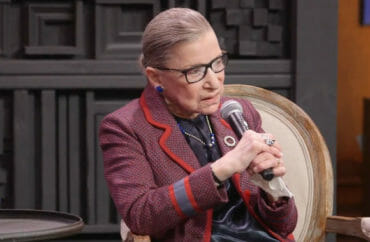
‘Fireworks were never her style’
One of the silver linings of the Obama presidency for his conservative critics was that Barack Obama consistently and publicly opposed silencing others because they disagree with you.
It was a message that college students were not eager to hear, and seem to have quickly forgotten since the Trump presidency began.
There’s another figure that students seem to collectively mythologize rather than actually learning from her example: Ruth Bader Ginsburg.
The supposedly “Notorious RBG” is the subject of a new documentary (now airing on your favorite cable network), but its creators seem to have missed a central feature of the Supreme Court justice’s life, according to Kyle Smith in National Review.
Her style and success is “an ongoing rebuke to the style of today’s Left,” with its preference for high-decibel moralizing and de-platforming, best expressed in campus activism.
While Smith is dismissive of RBG’s jurisprudence – saying nothing stands out from any other recent progressive justice – he’s more impressed by how she conducts herself:
She was never in anybody’s face, never angry. She didn’t waste her time on demonstrations and marches. She was more interested in poring over legal briefs at 3 a.m. In arguing before the Supreme Court, where she won five of six cases she litigated, her strategy was to smile deferentially …
While she was quite successful [as a litigator], it would be a stretch to call any of her High Court cases landmarks; Frontiero v. Richardson, a typical one, concerned an Air Force member denied a housing allowance because she was a woman. Ginsburg’s work as a litigator was important, but it didn’t send up fireworks, because fireworks were never her style.
It’s no slur when Smith refers to the justice as “halting, tight-lipped, mumbly.” Anyone who has attended oral argument at the Supreme Court can attest to how hard it is to make out anything she’s saying from the bench.
I covered a handful of oral arguments early in my career and usually had to check my Ginsburg quotes against the wire stories that were rushed out by mid-afternoon, and I doubt I’m the only reporter who did that. She doesn’t project herself – and perhaps it’s why everyone is so intent to hear her.
Other parts of her biography are nails on a chalkboard to her acolytes, as Smith details: her sacrifice for her husband and their child as she attended law school, her husband’s substantial role in her Supreme Court nomination, and most jarringly, her deep friendship with her ideological nemesis on the bench.
Can you imagine any remotely woke college student today willing to tolerate someone with views like Antonin Scalia’s, much less share his company without being compelled? As Smith says:
Sometimes [Scalia] would whisper things in her ear (this, one supposes, when the Court was in session) that were so funny she had to pinch herself not to laugh, she says. Her favorite Scalia joke? “I know what it is but I can’t tell you.” …
That bond is the film’s most telling implicit rebuke to today’s progressives, who can’t imagine being friends with someone like Scalia: This supposed avatar of feisty leftism knows when to put politics aside and how not to confuse being a liberal with being a good person.
MORE: Ginsburg says colleges railroad accused students
IMAGE: PBS Newshour/YouTube
Like The College Fix on Facebook / Follow us on Twitter







Please join the conversation about our stories on Facebook, Twitter, Instagram, Reddit, MeWe, Rumble, Gab, Minds and Gettr.